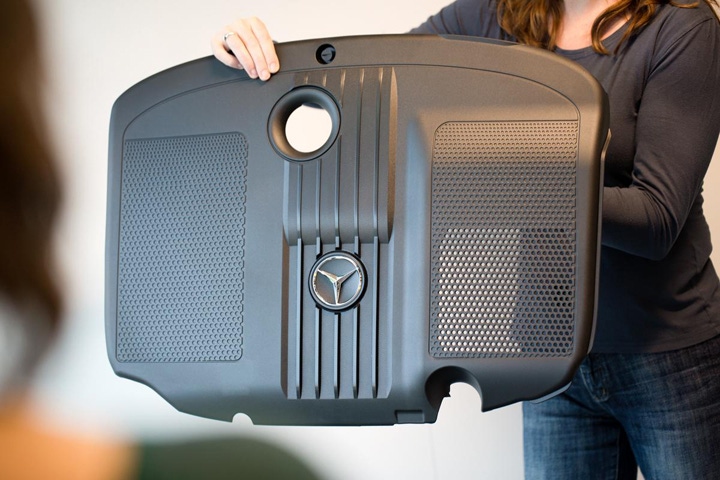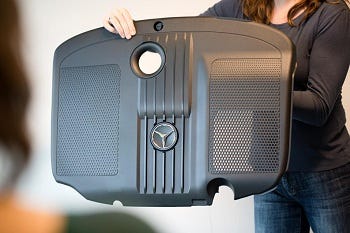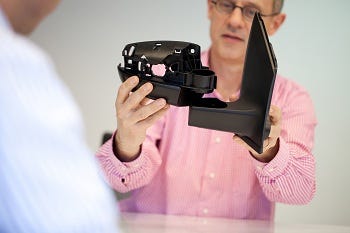10 years on: Polyamide proves its worth in auto sector
A certain supplier of extra-high flow polyamide 6 is celebrating a decade of delivery to customers, many of them in the auto sector, with a look back at where the resin has proved to be a successful solution. Akulon Ultraflow from DSM Engineering Plastics (Singapore) has reportedly proved its worth in components with long flow paths and high aesthetic requirements, with producticity gains to boot.
February 5, 2013

A certain supplier of extra-high flow polyamide 6 is celebrating a decade of delivery to customers, many of them in the auto sector, with a look back at where the resin has proved to be a successful solution. Akulon Ultraflow from DSM Engineering Plastics (Singapore) has reportedly proved its worth in components with long flow paths and high aesthetic requirements, with producticity gains to boot.
DSM claims Akulon Ultraflow PA 6 flows up to 80% faster than standard grades and enables injection molding cycle times to be cut by up to 25%, all with no significant loss of mechanical properties in the finished part. Reductions in cycle times are achieved through a combination of shorter injection- and holding-pressure times, faster crystallization speed, and the option to use processing temperatures 30-40°C lower than with competing polyamides, which allows cooling time to be cut.
|
Processors and users can benefit from reductions in the weight of their parts and in the energy it takes to mold them, reports DSM. "Another benefit of the resin is less molded-in stress, which otherwise could result in warpage. Opportunities to cut injection molding machine clamp force (enabling the use of smaller machines), increase mold cavitation, reduce the number of injection ports in large parts, and even use smaller tooling, also make their contribution to reduced system costs.
DSM Akulon Ultraflow PA 6 formulations include unfilled, high stiffness (30-40% glass reinforcement), and very high stiffness types (>50% glass, as well as glass/mineral combinations). Grades with 60% glass fiber reinforcement have processing characteristics very similar to those of a standard PA 6 containing just 30% glass. Organic heat stabilization packages also available allow for corrosion-free contact between plastics and metal inserts.
Auto applications
Automobile engine covers have reportedly proven to be an ideal application for Akulon Ultraflow, where its superior flow allows designers to create parts that would be much more difficult, if not impossible, to mold in standard PA 6. Better flow also translates into lower wall thickness and reduced material usage, providing cost savings on what can be quite large parts. In such large parts as engine covers, it is possible to shave around 1 mm off 3.5-mm thick walls.
DSM has developed grades intended specifically for automobile engine covers. They contain up to 40% of glass and mineral reinforcement, and yet have good surface quality. Their good weldability and aging performance in the presence of hot oils also make them suitable for rocker valve covers, air intake manifolds and other engine compartment solutions.
Use of Akulon Ultraflow in bobbins addresses two common issues: 1) bobbin collapse during winding; and 2) wire displacement during overmolding. Akulon Ultraflow K-FKG6 and K-FKG8 with 30% and 40% glass fiber are commonly used for this application. Despite their high glass loadings, these two grades easily fill thin walls and provide the necessary stiffness to prevent bobbin collapse. The pressure to fill is typically 20 to 30% less than with standard polyamide 6. Cycle times as short as half those required for standard PA6 have been noted, greatly increasing productivity.
Several sensor suppliers to the auto industry have been using Akulon Ultraflow for years as their primary material for overmolding sensors for crank and camshaft sensors. Akulon Ultraflow works for them because it flows so well over long distances and because they can use low injection pressures when they are overmolding electronics and bobbins. It works great with 'melt ribs', allowing for a hermetic seal around an overmolded product. Suppliers appreciate the material consistency that Akulon Ultraflow delivers.
In the automotive sector, Akulon Ultraflow is also employed in underhood automotive components and assemblies (air cleaners, intake manifolds, engine covers, fans & shrouds, oil sumps), high-visibility automotive interior items (door handles, seat adjuster levers, ventilator lamellae, mirror brackets), automotive safety applications (air bag containers and such structural parts as front-end modules), and seat components.
About the Author(s)
You May Also Like




